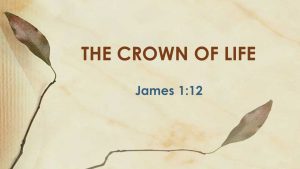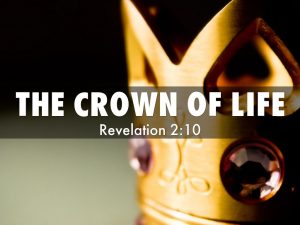Have you ever wondered about the crown of life? A reader recently sent in the following question about what the crown of life is, though it might also be important to understand how we gain the crown of life. But let us begin with her question. Here is what she wrote:
I just finished reading your article on Yeshua drinking the bitter cup. I am just amazed at this view. I was searching for what it meant because a few years back I was told to drink a bitter cup. All I know is I have never felt lost until that time. To drink the dregs of it is a horrible thing, and all I had was a taste. But Jesus drank the dregs for us! I am still stunned at what you have shown. Your article makes me appreciate even more what He has done for us. It makes perfect sense to me.
I would like to ask you if you have written anything on the crown of life? After all this incident, I was told on April 19 that I had made it through my tribulation and received the crown of life. Can you help explain what this means?
First, thank you for the encouragement about the article where Jesus prayed to “Let this cup pass.” I must give credit to one of my seminary professors for that view.
From your question, it sounds like maybe you are attending a church or Bible study that gives prophetic “Words of knowledge” to its members. Is that true?
Be careful about what people tell you through these “words of knowledge.” My experience is that usually the messages they give are designed to control you and instill fear in you, rather than help or encourage. In the case of the two things you were told, it looks like someone quoted some poorly-misunderstood Bible passages at you, and then misapplied them to your life so that you lived in fear.
Remember, God has not given us a Spirit of fear, but of power, love, and self-discipline (2 Timothy 1:7). If a message comes “by the Spirit” and results in you feeling lost and fearing for your life, it is not likely a message that originated with God.
But let us move on to your question about the crown of life.
The Crown of Life
So what about the Crown of Life? What is the crown of life and how can we gain it?
 There are five crowns mentioned in Scripture. They are the Everlasting Crown (1 Cor 9:25), the Crown for the One who Wins Souls (Php 4:1; 1 Thess 2:19), the Crown of Righteousness (2 Tim 4:8), the Crown of Glory (1 Pet 5:4), and the Crown of Life (Jas 1:12; Rev 2:10).
There are five crowns mentioned in Scripture. They are the Everlasting Crown (1 Cor 9:25), the Crown for the One who Wins Souls (Php 4:1; 1 Thess 2:19), the Crown of Righteousness (2 Tim 4:8), the Crown of Glory (1 Pet 5:4), and the Crown of Life (Jas 1:12; Rev 2:10).
Part of the difficulty with these crowns is that most cultures today do not use crowns, and those that do reserve the crowns for royalty. But the word used for “crown” is stephanos, which can also refer to a “reward” or “laurel wreath.” In the original Greek Olympics, the winner of the sporting contests was awarded the stephanos, a laurel crown.
So each of the crowns mentioned above represents a reward for some particular special act of service or perseverance within the Kingdom of God. By all appearances, the crowns will be some sort of actual reward handed out to believers when Jesus returns again in the future. This will be at the Bema — the Judgment Seat of Christ.
Therefore, none of the crowns are equivalent to eternal life itself. That is, while eternal life is the absolutely free gift of God to anyone who simply believes in Jesus for it (John 3:16; 5:24; 6:47), the various crowns are rewards that are given to Christians who complete certain tasks and practice certain behaviors.
Each of the five crowns deserves its own study, but let me just focus on the Crown of Life. (There is a short study of the other crowns in my Gospel Dictionary Online Course, in the lesson on “Crown.”)
The Crown of Life is NOT Eternal Life
James 1:12 and Revelation 2:10 indicate that the Crown of Life is for those who persevere in faith through temptation, tribulation, and persecution.
Some people wrongly teach, however, that if you fail to persevere in faith through temptation, tribulation, or persecution, that you prove you do not have life, or that God will take away your life. This is not true.
 Eternal life is a free gift to everyone and anyone who believes in Jesus for it. You do not have to work your way to eternal life. Eternal life cannot be earned or kept by good works.
Eternal life is a free gift to everyone and anyone who believes in Jesus for it. You do not have to work your way to eternal life. Eternal life cannot be earned or kept by good works.
The Crown of Life, however, is a reward for special acts of service and perseverance under trial.
The Crown of Life is special reward for a special act of service and dedication to the King.
So if you are experiencing severe temptation, trials, or persecution, be encouraged and persevere through them.
Just as a runner perseveres through the difficulties of the race so that he reaches the finish line and receives the reward, so also Jesus wants to put the Crown of Life upon your head when you reach the finish line after persevering through pain, trials, and persecution.
It will probably not be an actual crown or ring of leaves, but will be some sort of special blessing, honor, privilege, or recognition in the future, eternal reign of Jesus.
By offering this Crown, Jesus encourages us to stay strong, keep the course, and remain faithful.
Let us look in more detail at the two texts which mention the Crown of Life.
The Crown of Life in James 1:12
Blessed is the man who endures temptation; for when he has been approved, he will receive the crown of life which the Lord has promised to those who love Him (James 1:12).
 The crown of life that James mentions here is often confused with eternal life.
The crown of life that James mentions here is often confused with eternal life.
But as with every other crown, we know that the crown of life cannot be the same thing as eternal life because eternal life is the free gift of God to everyone who believes in Jesus for it, but the crown of life, as described here by James, is given to those who endure temptation.
In other words, Jesus gives the crown of life to those who persevere in faith through temptation, tribulation, and persecution.
Therefore, the crown of life is a reward for a life well-lived. It is an honor that Jesus bestows upon those who endure the trials and temptations of this life.
Some people wrongly teach that those who fail to persevere in the midst of temptation prove that they not actually Christians or that as a result of their failure, God takes away their eternal life. But this is not what James is teaching.
Eternal life is a free gift to everyone and anyone who believes in Jesus for it. The crown of life, however, is a reward for special acts of service and perseverance under trial.
This is actually a great encouragement for those who face trials and temptations. It is much easier to endure in the midst of trials when we know that we are safe and secure in the arms of God, and that even if we fail to stand up in the temptation, He will not abandon or forsake us, but will always be there to love, comfort, protect, and restore us.
This sense of safety gives us strength to stand in the midst of temptation. It allows us to run the race with perseverance, rather than giving up out of fear and frustration.
This crown is an encouragement to stay strong, keep the course, and remain faithful. As with the other crowns, it is likely not a literal crown, but is symbolic of praise, honor, and glory that Jesus bestows upon those who faithfully stand with Him in the midst of trial and temptation.
The Crown of Life in Revelation 2:10
Do not fear any of those things which you are about to suffer. Indeed, the devil is about to throw some of you into prison, that you may be tested, and you will have tribulation ten days. Be faithful until death, and I will give you the crown of life (Revelation 2:10).
 The crown mentioned in Revelation 2:10 is also the crown of life mentioned in James 1:12. In both cases, the crown of life is a special honor, reward, or recognition given by Jesus to those who stand up against the temptation and trials of the devil.
The crown mentioned in Revelation 2:10 is also the crown of life mentioned in James 1:12. In both cases, the crown of life is a special honor, reward, or recognition given by Jesus to those who stand up against the temptation and trials of the devil.
The crown of life is not eternal life, but is a way that Jesus recognizes and honors those people who faithfully serve Him and remain steadfast in the storms of life (cf. Revelation 3:11).
Here in Revelation 2:10, Jesus warns the Christians in Smyrna that the devil is coming to accuse and test them. Some of them will be thrown into prison, and they may even lose their lives. But Jesus says that if they remain faithful, He will bless and honor them with the crown of life when they stand before Him in the resurrection. They will be shown special honor in the life to come.
One further piece of evidence that the crown of life is not the same as eternal life is that all seven letters to the churches in Revelation 2–3 contain promises of rewards and special blessings for those Christians who persevere and overcome.
Just as eating from the tree of life (Rev 2:7), getting a new name (Rev 2:17), receiving power to rule the nations (Rev 2:26), being recognized before God in heaven (Rev 3:5), and being made a pillar in the temple of God (Rev 3:12) are not the same thing as receiving eternal life, so also, the crown of life is not the same thing as eternal life.
These are all special ways that Jesus rewards and recognizes those who faithfully serve and honor Him.

So What is the Crown of Life?
The crown of life is not equivalent to eternal life. Eternal life is the free gift of God to all who believe in Jesus for it. The crown of life (like all the crowns mentioned in Scripture) is a form of honor and recognition that Jesus bestows upon those who faithfully serve and honor Him.
It is helpful to think of these crowns as a medal for winning a race, or as some form of public recognition where we receive praise for a job well done. This recognition and reward will be received at the Judgment Seat of Christ. This is especially true of the crown of life.
So as you live your life, be eager for the Lord’s coming, faithfully love and serve one another, teach and train each other in the truths of the gospel, and stand strong in the face of trial and temptation. If you do these things, you will receive crowns from Jesus so that you may cast them at His feet in eternity.
 Understanding the Gospel requires us to properly understand the key words and terms of the Gospel. Take my course, "The Gospel Dictionary" to learn about the 52 key words of the Gospel, and hundreds of Bible passages that use these words.
Understanding the Gospel requires us to properly understand the key words and terms of the Gospel. Take my course, "The Gospel Dictionary" to learn about the 52 key words of the Gospel, and hundreds of Bible passages that use these words.
This course costs $297, but when you join the Discipleship group, you can to take the entire course for free.




 As this inheritance is almost always associated with obedience or a life of faithful living, people who think that our inheritance is the same thing as eternal life from God will get very confused about how to receive eternal life.
As this inheritance is almost always associated with obedience or a life of faithful living, people who think that our inheritance is the same thing as eternal life from God will get very confused about how to receive eternal life. Most people do not realize it, but the biblical teaching on rewards is one of the most prevalent teachings in the New Testament. The concept is everywhere. And much like inheritance, the biblical teaching on rewards often includes calls for faithfulness, obedience, self-sacrifice, and loving service.
Most people do not realize it, but the biblical teaching on rewards is one of the most prevalent teachings in the New Testament. The concept is everywhere. And much like inheritance, the biblical teaching on rewards often includes calls for faithfulness, obedience, self-sacrifice, and loving service.
 So, for example, the word “saved” might refer to being delivered from one’s enemies, or getting healed from a sickness, or being rescued from drowning at sea. Obviously, these words are not related to gaining or keeping eternal life. I would guess that the majority of times the words saved, save, salvation, etc., are used in Scripture, they are used in this way (e.g., Matt 8:25; Acts 27:31).
So, for example, the word “saved” might refer to being delivered from one’s enemies, or getting healed from a sickness, or being rescued from drowning at sea. Obviously, these words are not related to gaining or keeping eternal life. I would guess that the majority of times the words saved, save, salvation, etc., are used in Scripture, they are used in this way (e.g., Matt 8:25; Acts 27:31). Once you see the difference in Scripture between the word “saved” and the terms “eternal life” or “everlasting life” or even something like “justification” you begin to see that while there are numerous verses which talk about saving something that can be lost, there is not a single verse in the Bible which talks about losing eternal life, losing everlasting life, or losing our justification. All of these gifts of God, once given, are never revoked or taken back.
Once you see the difference in Scripture between the word “saved” and the terms “eternal life” or “everlasting life” or even something like “justification” you begin to see that while there are numerous verses which talk about saving something that can be lost, there is not a single verse in the Bible which talks about losing eternal life, losing everlasting life, or losing our justification. All of these gifts of God, once given, are never revoked or taken back.